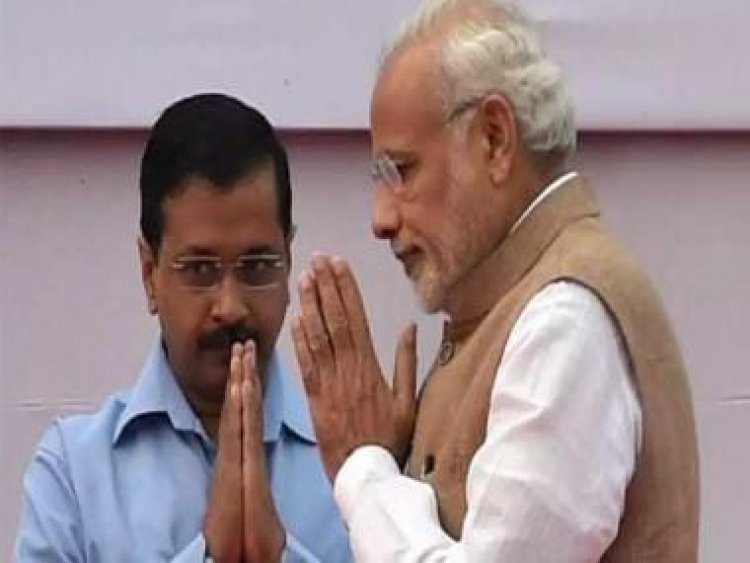Delhi government schools flunking in learning indices, Arvind Kejriwal attempts to shift blame
Delhi government schools flunking in learning indices, Arvind Kejriwal attempts to shift blame

New Delhi: Chief Minister of Delhi Arvind Kejriwal, who has been boasting about ‘Delhi School Model’ and recently been awakened by the NCPCR for poor infrastructure and teachers issues, has now attempted to shift the blame. The Delhi CM has written a letter to Prime Minister Narendra Modi alleging that more than 80 per cent government schools in the country are worse than junkyards.
Sharing a copy of the letter on Twitter, Kejriwal wrote: “You have made a plan for the modernisation of 14,500 schools but if we work at this pace, it will take 100 years to upgrade all our government schools. I request you to prepare a plan for the redevelopment of all 10 lakh government run schools in the country.”
प्रधानमंत्री जी को मेरा पत्र। उन्होंने 14,500 स्कूलों को अपग्रेड करने का एलान किया, बहुत अच्छा। लेकिन देश में 10 लाख सरकारी स्कूल हैं। इस तरह तो सारे स्कूल ठीक करने में सौ साल से ज़्यादा लग जाएँगे। आपसे अनुरोध है कि सभी दस लाख स्कूलों को एक साथ ठीक करने का प्लान बनाया जाए। pic.twitter.com/Cegk9XvIDZ
— Arvind Kejriwal (@ArvindKejriwal) September 7, 2022
Continuing from Tuesday when the Aam Aadmi Party (AAP) national convenor had termed the prime minister's decision to modernise 14,500 schools "a drop of water in the ocean", he again pushed for a plan to upgrade all 10 lakh government schools in the country.
"In India, daily 27 crore students go to school daily, out of which 18 crore students go to government schools. The condition of 80 per cent government schools is worse than a junkyard. If we are giving such education to crores of our children, imagine how the country will be developed," Kejriwal said in the letter written in Hindi.
On Monday, Prime Minister Narendra Modi announced that 14,500 schools across the country would be developed and upgraded under the 'PM-SHRI Yojana'. They will be equipped with modern infrastructure, including labs, smart classrooms, libraries and sports facilities, he added.
Though Kejriwal has been persistent in promoting 'Delhi School Model' in other states, a recent report by National Commission for Protection of Child Rights (NCPCR) showed that not all is perfect as far as schools in the capital run by the state government are concerned.
Teachers issues, poor infrastructures in Delhi government-run schools: NCPCR
The NCPCR has prepared a report based on its own findings and with inputs from the National Achievement Survey (NAS) 2021 for Class 8 conducted by the National Council of Educational Research and Training (NCERT).
Recently NCPCR received a complaint regarding the Desh Ke Mentor programme launched by the Government of NCT of Delhi. It was alleged that as per the scheme, children and unknown people are brought together for the purpose of education and career guidance. This may expose children to probable safety and security risks.
After this, a team of NCPCR official led by Chairperson Priyank Kanoongo visited the government schools in the national capital and found a number of issues including discrepancies with respect to the infrastructure. It also highlighted that posts of Principal/Head Master are vacant in most schools.
The NCPCR report stated that Delhi scored below the national average for subjects namely mathematics, science and social science. The Delhi government schools have done well only in language, it added.
In mathematics, for example, the better-performing states are Uttar Pradesh, Gujarat, Haryana, Bihar, Chandigarh, Madhya Pradesh and Punjab, the report said.
In science, schools in Gujarat, Madhya Pradesh and Rajasthan have done much better than Delhi. In social science again, schools in Punjab, Rajasthan, Madhya Pradesh, Odisha and Assam have fared much better than the students of Delhi schools, as per the NAS report.
The report further stated that Delhi has 1,027 schools run by the state government and these are from the pre-primary to elementary level. The schools in Delhi are just 1.3 per cent of the total state governments and Union Territories in schools if compared to other states and union territories, which is much lower.
Also, to make the elementary education more inclusive, the Right To Education (RTE) Act gave schools the responsibility to reserve 25 per cent of the seats in primary or pre-primary level, for which the state government reimburses the educational expenses according to the per-child expenses mandated by the state or actual school fee per child. However, according to the NCPCR report, the Delhi government schools have not reached the benchmark.
In 2021-2022 academic year, approximate seats allotted for EWS category children in Delhi private schools were 40,000, wherein admissions were given to only 28,000 children. In the next academic year (2022-2023), the approximate seats allotted to EWS category children in Delhi private schools were 33,000, wherein admissions were given to around 27,000 children.
The report also highlighted that though Delhi has developed an online system for admissions under, instances of denial of admission to children belonging to the EWS category by the private schools of Delhi, even after getting selected in the lottery drawn for admissions, have been noticed.
AAP unhappy with NCPCR report, blames Centre
The AAP said that the NCPCR report projected a wrong picture and that the Centre was tweaking the figures to run down a successful scheme of the Delhi government to score political points.
Responding to the NCPCR report, AAP MLA Atishi said, "We would like to invite the NCPCR Chairman to come and visit some of our Delhi government schools and see for themselves how they have been transformed. The NCPCR should also do a report on BJP-ruled MCD schools which have poor infrastructure, unusable toilets, shortage of rooms and poor NAS performance."
With inputs from agencies
Read all the Latest News, Trending News, Cricket News, Bollywood News,
India News and Entertainment News here. Follow us on Facebook, Twitter and Instagram.
What's Your Reaction?



























































